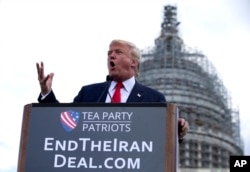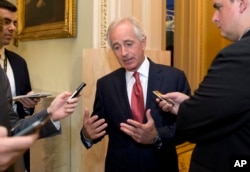Iran is threatening to retaliate after the U.S. Senate gave Congress’ final approval to an extension of the American sanctions against Iran that lawmakers of both parties said is crucial to enforcing the international nuclear accord with Tehran.
“Iran has proved that it sticks to its international agreements, but it also has appropriate responses for all situations,” said Iran Foreign Ministry spokesman Bahram Ghasemi. “The extension of sanctions by the U.S. Congress is a violation of the deal.”
Ghasemi was not specific about what action would be taken.
Last month, Iranian Supreme Leader Ayatollah Ali Khamenei said he considered the sanctions bill a breach of the nuclear deal and threatened retaliation.
“They’re bluffing,” said Middle East expert Matthew McInnis at the Washington-based American Enterprise Institute. “The Iranians are quite committed to the deal. They understood that these types of legislation such as the Iran Sanctions Act, which have been in effect for a long time, these types of things would likely be renewed.”
"Preserving these sanctions is critical given Iran's disturbing pattern of aggression and its persistent efforts to expand its sphere of influence across the Middle East," said Senate Majority Leader Mitch McConnell, a Kentucky Republican.
"These authorities should remain in place as we address how best to deal with the Iranian missile tests, support to Hezbollah and support of the Syrian regime," McConnell added.
WATCH: Related video clip
Partly lifted
Enacted two decades ago, the sanctions were meant to address long-standing U.S. concerns such as Iran's support for international terrorism. Partially lifted under the nuclear accord implemented last year, lawmakers said sanctions should be kept at the ready.
"The JCPOA [Joint Comprehensive Plan of Action] specifically provides for the snap-back of sanctions in the event Iran violates the provisions of the agreement," said Maryland Democrat Ben Cardin. "In order to have snap-backs, you have to have the sanctions regime in place."
Iranian officials blasted the bill, arguing it violates the nuclear pact and will have consequences.
"They're bluffing," said Middle East expert Matthew McInnis at the Washington-based American Enterprise Institute. "The Iranians are quite committed to the deal. They understood that these types of legislation such as the Iran Sanctions Act, which have been in effect for a long time, these types of things would likely be renewed."
Trump ripped deal
President-elect Donald Trump repeatedly slammed the nuclear accord during the campaign.
"The stupidest deal of all time," Trump said in the final presidential debate in October. "A deal that's going to give Iran absolutely nuclear weapons. Iran should write us yet another letter saying thank you very much."
"I recommended against ripping up the deal [when Trump enters office]," McInnis said. "President Trump, if he really wants a deal that hits all the big points on [nuclear] inspections and perhaps a better sunset clause [endpoint], he's going to have to look at very severe pressure on Iran and, frankly, with our allies to make that happen."
For now, lawmakers are keeping existing sanctions in place while not ruling out further measures to boost pressure on Iran in the future.
"As flawed as the JCPOA was in my view, the Iranians will know the consequences of any breach," said Democratic Senator Robert Menendez of New Jersey. "We will deal with missile proliferation, terrorism, regional destabilization that are just as dangerous and just as threatening to American security."
"President-elect Trump and his administration [will] have the tools necessary to push back against the regime's hostile actions," Republican Senator Bob Corker of Tennessee said in a statement. "I am pleased by the overwhelming support this bill received in both the House and Senate and look forward to continuing our work to hold Tehran accountable."
No veto threat
The White House said President Barack Obama has ample authority to impose punitive measures against Iran, with or without specific legislation, but issued no veto threat of the Iran Sanctions Act.
"The administration retains and has used substantial authority to impose sanctions against Iran," White House spokesman Josh Earnest said. "And we're not shy about using it."
"We'll take a look at the bill that's been passed," Earnest said.
VOA's Elizabeth Cherneff contributed to this report.








